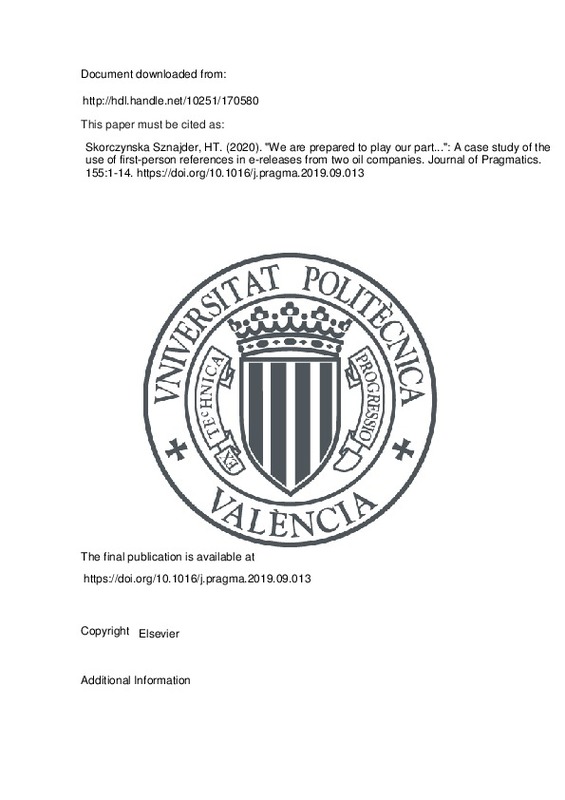Catenaccio, P. (2008). Press releases as a hybrid genre. The discourse of news management, 18(1), 9-31. doi:10.1075/prag.18.1.02cat
Fasulo, A., & Zucchermaglio, C. (2002). My selves and I: identity markers in work meeting talk. Journal of Pragmatics, 34(9), 1119-1144. doi:10.1016/s0378-2166(01)00051-0
Fetzer, A., & Bull, P. (2012). Doing leadership in political speech: Semantic processes and pragmatic inferences. Discourse & Society, 23(2), 127-144. doi:10.1177/0957926511431510
[+]
Catenaccio, P. (2008). Press releases as a hybrid genre. The discourse of news management, 18(1), 9-31. doi:10.1075/prag.18.1.02cat
Fasulo, A., & Zucchermaglio, C. (2002). My selves and I: identity markers in work meeting talk. Journal of Pragmatics, 34(9), 1119-1144. doi:10.1016/s0378-2166(01)00051-0
Fetzer, A., & Bull, P. (2012). Doing leadership in political speech: Semantic processes and pragmatic inferences. Discourse & Society, 23(2), 127-144. doi:10.1177/0957926511431510
Goffman, E. (1976). Replies and responses. Language in Society, 5(3), 257-313. doi:10.1017/s0047404500007156
Harwood, N. (2005). ‘Nowhere has anyone attempted … In this article I aim to do just that’. Journal of Pragmatics, 37(8), 1207-1231. doi:10.1016/j.pragma.2005.01.012
Harwood, N. (2005). ‘We Do Not Seem to Have a Theory … The Theory I Present Here Attempts to Fill This Gap’: Inclusive and Exclusive Pronouns in Academic Writing. Applied Linguistics, 26(3), 343-375. doi:10.1093/applin/ami012
Harwood, N. (2006). (In)appropriate Personal Pronoun Use in Political Science. Written Communication, 23(4), 424-450. doi:10.1177/0741088306293921
Harwood, N. (2007). Political scientists on the functions of personal pronouns in their writing: An interview-based study of ‘I’ and ‘we’. Text & Talk, 27(1). doi:10.1515/text.2007.002
Hyland, K. (2001). Humble servants of the discipline? Self-mention in research articles. English for Specific Purposes, 20(3), 207-226. doi:10.1016/s0889-4906(00)00012-0
Hyland, K. (2002). Authority and invisibility. Journal of Pragmatics, 34(8), 1091-1112. doi:10.1016/s0378-2166(02)00035-8
JACOBS, G. (1998). Projected discourse: An analysis of receiver roles in press releases. Text - Interdisciplinary Journal for the Study of Discourse, 18(4). doi:10.1515/text.1.1998.18.4.505
Jacobs, G. (1999). Self-reference in press releases. Journal of Pragmatics, 31(2), 219-242. doi:10.1016/s0378-2166(98)00077-0
Kranert, M. (2017). ‘Today I offer you, and we offer the country a new vision’: The strategic use of first person pronouns in party conference speeches of the Third Way. Discourse & Society, 28(2), 182-203. doi:10.1177/0957926516685463
Lassen, I. (2006). Is the press release a genre? A study of form and content. Discourse Studies, 8(4), 503-530. doi:10.1177/1461445606061875
McLaren-Hankin, Y. (2008). `We expect to report on significant progress in our product pipeline in the coming year’: hedging forward-looking statements in corporate press releases. Discourse Studies, 10(5), 635-654. doi:10.1177/1461445608094216
Maat, H. P. (2007). How Promotional Language in Press Releases Is Dealt With by Journalists: Genre Mixing or Genre Conflict? Journal of Business Communication, 44(1), 59-95. doi:10.1177/0021943606295780
Pennycook, A. (1994). The politics of pronouns. ELT Journal, 48(2), 173-178. doi:10.1093/elt/48.2.173
Serrano, M. J., & Aijón Oliva, M. Á. (2010). La posición variable del sujeto pronominal en relación con la cortesía interactiva. Pragmalinguistica, (18), 170-204. doi:10.25267/pragmalinguistica.2010.i18.08
Skorczynska Sznajder, H. T. (2016). A COMPARATIVE STUDY OF KEYWORDS IN ENGLISH-LANGUAGE CORPORATE PRESS RELEASES FROM EUROPEAN COMPANIES: INSIGHTS INTO DISCURSIVE PRACTICES. Discourse and Interaction, 9(1), 49. doi:10.5817/di2016-1-49
Sleurs, K., & Jacobs, G. (2005). Beyond preformulation: an ethnographic perspective on press releases. Journal of Pragmatics, 37(8), 1251-1273. doi:10.1016/j.pragma.2004.11.007
Stirling, L., & Manderson, L. (2011). About you: Empathy, objectivity and authority. Journal of Pragmatics, 43(6), 1581-1602. doi:10.1016/j.pragma.2010.12.002
Strobbe, I., & Jacobs, G. (2005). E-releases: A view from linguistic pragmatics. Public Relations Review, 31(2), 289-291. doi:10.1016/j.pubrev.2005.02.009
Vaughan, E., & Clancy, B. (2013). Small Corpora and Pragmatics. Yearbook of Corpus Linguistics and Pragmatics, 53-73. doi:10.1007/978-94-007-6250-3_4
Whitley, M. S. (1978). Person and Number in the Use of We, You, and They. American Speech, 53(1), 18. doi:10.2307/455337
[-]







![[Cerrado]](/themes/UPV/images/candado.png)


